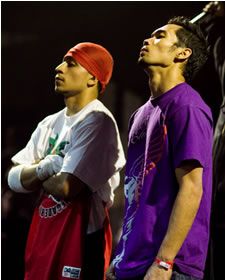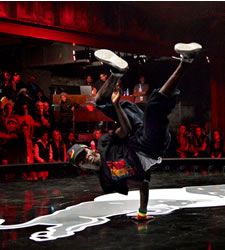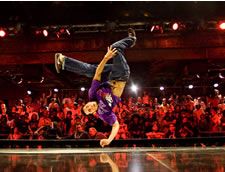
Ronnie and Roxrite are among the b-boys battling it out
High energy documentary Turn It Loose had its UK premiere at the 2009 Edinburgh Film Festival last month. Shot in the run up to and during the breakdancing championship BC One in Soweto, South Africa, it looks at the hopes, aspirations and athleticism of six of the 16 finalists battling to be the best.
Unlike many similar rap-inflected stories, this is a lot more than simply an extended pop video – with the filmmaker giving the b-boys a chance to tell their stories away from the posturing of the breakdance performance itself.
“I think that we treated them seriously, that’s what I’m proud about, says director Alastair Siddons when I catch up with him part way through the Festival. “They’re young kids who have got their passion but lots of films about young boys thrive on – or survive on – humiliating them in a way. Gently mocking them. There are a few laughs in this film but it’s not at their expense. We’ve treated them like adults and artists and I hope that comes across.
“I like the idea of taking the hip-hop out of it,” he adds. “We purposefully didn’t want to film the characters in that kind of clichéd hip-hop way.
“When you’re filming them, they’re giving it the usual façade of hip-hop but we made a conscious decision to really get under the skin of that and present them as human beings – which they all are, of course. And they haven’t really got the hip-hop swagger like lots of rappers or music people have.”
Siddons knows a thing or two about the music business, having worked on pop videos for artists including The Streets, Roots Manuva and Kano, but he says that after a while making videos is “not that thrilling”. Prior to his foray into videos, however, Siddons had worked on a string of documentaries including BBC Three series Towerblock Dreams and Channel 4’s The Last Peasants, so when the chance came to combine both the two disciplines he jumped at the chance.
“I really fought hard to make it,” he says. “I had done lots of videos for UK rappers. But I wanted to make a dance film that really shed a new light on breakdancing. Whenever I was mentioning to people that I was doing a film about breakdancing you get the same reaction from 99 per cent of them, which is ‘Oh, isn’t that Eighties?’ But as soon as you meet the b-boys, it’s completely different. There’s a sort of spirituality that’s so obvious and yet the other films that there have been about break dancing – they’ve all been good, but they’ve set out to go down the route of that traditional image of them. We set out to try to get under it’s skin and find the soul of it.”

Siddons documentary shows that – aside from a shared passion for their art – the b-boys have very different backgrounds and attitudes to life. Ben-J is a Senegalese breakdancer making the pilgrimage to the championships for the first time ever and bringing with him the hope of all the b-boys back home, not to mention his local community. French-born Lilou, meanwhile, is a former winner – who refused point-blank to return the trophy “They really did come after him,” says Siddons, who gets Lilou to show him the winner’s belt early on in the film. “They sent four different couriers to his block of flats and the last time, the courier got chased out of town.”
Rounding out the documentary ‘cast’ are Taisuke, a young and painfully shy Japanese b-boy, Korean champion Hong 10, who is struggling with the weight of expectation that comes with being reigning title-holder and Americans Ronnie, who is looking for revenge for defeat in the 2006 final, and Roxrite – who moved to the States from Mexico when he was eight.
“What I thought was really interesting was that the French boy was born in France but he was representing Algeria and the American guy was born in Mexico, moved to the US when he was eight and had a pretty tough, shit life in America and yet he was still representing America – it would be unheard of for him to represent Mexico,” says Siddons. “It really summed up the difference regarding immigration between America and France.”
Amazingly, given that Siddons concentrated heavily on just six out of 16 competitors, most of them progress to the latter stages of the competition. Siddons had previously shot a short documentary, Raging Bulls, which focussed on the BC One competition of 2006 and acted as a calling card when he was trying to raise funding for the longer feature. It also proved to be a very useful exercise in research.
“I made quite a calculated decision, which paid off really well because we filmed all four semi-finalists,” he says. “I’d been at the competition the year before and quite a few of them come back. We filmed about half of them and there were a few I was really worried about who we hadn’t filmed, so I got lots of stuff around the competition of everybody so I thought if they make it through I’ve still got a little bit of that, cos you can’t fake the build up to something, that’s really difficult.
“The competition is two hours long, so imagine, every five minutes another one of your characters is getting knocked out, but on the day I was quite lucky. But I was terrified and, obviously, I had favourite characters who I wanted to do well.”
Siddons' passion for the project is obvious and, it’s probably just as well, since he had his own battles to fight when it came to making it – zipping back and forth between the various countries to shoot the boys in the run up to the final.

“I had a crazy summer,” he says. “I’m not complaining because it was amazing, but, from May to the end of September I’d go to Japan on one day, come back to London for one night and then fly to Korea the next day or go the other way to Las Vegas or to Senegal. I had about 10 days with each character and four days with the crew.
“Just the early stage was expensive and we had a long edit on it as well because there were so many languages. There were six languages and we shot more – eight in the competition – so just getting through those rushes itself took months and months and months of translators coming into the edit and spending whole days with you and that all adds up but you couldn’t do it any other way.
“It was all jumping through hoops, all the way, getting to one stage and then raising a bit more money and then getting to the next stage and, in a way, it’s quite good because you’re having to prove yourself all the time. Every stage of it has to be of a certain standard otherwise you’re not going to get the money to finish the time slice or whatever.
“In a way it’s a good way of working, rather than getting all the money up front when you can relax a little bit it keeps you really pushing yourself. We had to fight for music and everything.”
For now, the fight continues, as Turn It Loose has yet to find a distributor, but Siddons is hoping it will get one soon and is also aiming to take it to other film festivals. Watch the trailer here and for more information about the film visit www.turnitloosemovie.com.





















